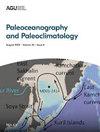全新世拉布拉多陆架环境变化的生物标志物记录
IF 3.2
2区 地球科学
Q2 GEOSCIENCES, MULTIDISCIPLINARY
引用次数: 0
摘要
劳伦蒂德冰盖(LIS)的最终消亡以及之前和之后拉布拉多海西部的海洋学变化,为改进对未来气候变暖和格陵兰冰盖进一步融化的预期气候预测提供了至关重要的见解。然而,尽管LIS在全新世期间的最终消失受到了很好的限制,但海冰在由此产生的融水事件中的反应尚不完全清楚。在这里,我们对拉布拉多大陆架西北部过去9.3 Kyr BP的古海洋变化进行了重建,特别关注8.2 Kyr BP前后的最终融水事件与海冰和浮游植物生产力之间的相互作用(例如,IP25、HBI III(Z)、芸苔素、二甾醇、生物蛋白石、总有机碳)。我们的记录表明,在8.9 Kyr BP之前,拉布拉多大陆架的海冰覆盖率较低,浮游植物生产力较高。从8.55 Kyr BP开始,阿加西-奥吉布韦湖和哈德逊湾冰鞍的融水事件导致表面盐度下降,有利于海冰的形成。在过去的约7.5 Kyr BP,海冰主要通过当地洋流输送到研究区域,如内拉布拉多洋流和巴芬洋流。我们的发现为海冰对融水排放增加以及大气和海洋环流变化的反应提供了新的见解。本文章由计算机程序翻译,如有差异,请以英文原文为准。
Biomarker Records of Environmental Shifts on the Labrador Shelf During the Holocene
The ultimate demise of the Laurentide Ice Sheet (LIS) and the preceding and succeeding oceanographic changes along the western Labrador Sea offer insights critically important to improve climate predictions of expected future climate warming and further melting of the Greenland ice cap. However, while the final disappearance of the LIS during the Holocene is rather well constrained, the response of sea ice during the resulting meltwater events is not fully understood. Here, we present reconstructions of paleoceanographic changes over the past 9.3 Kyr BP on the northwestern Labrador Shelf, with a special focus on the interaction between the final meltwater event around 8.2 Kyr BP and sea ice and phytoplankton productivity (e.g., IP25, HBI III (Z), brassicasterol, dinosterol, biogenic opal, total organic carbon). Our records indicate low sea‐ice cover and high phytoplankton productivity on the Labrador Shelf prior to 8.9 Kyr BP, sea‐ice formation was favored by decreased surface salinities due to the meltwater events from Lake Agassiz‐Ojibway and the Hudson Bay Ice Saddle from 8.55 Kyr BP onwards. For the past ca. 7.5 Kyr BP sea ice is mainly transported to the study area by local ocean currents such as the inner Labrador and Baffin Current. Our findings provide new insights into the response of sea ice to increased meltwater discharge as well as shifts in atmospheric and oceanic circulation.
求助全文
通过发布文献求助,成功后即可免费获取论文全文。
去求助
来源期刊

Paleoceanography and Paleoclimatology
Earth and Planetary Sciences-Atmospheric Science
CiteScore
6.20
自引率
11.40%
发文量
107
期刊介绍:
Paleoceanography and Paleoclimatology (PALO) publishes papers dealing with records of past environments, biota and climate. Understanding of the Earth system as it was in the past requires the employment of a wide range of approaches including marine and lacustrine sedimentology and speleothems; ice sheet formation and flow; stable isotope, trace element, and organic geochemistry; paleontology and molecular paleontology; evolutionary processes; mineralization in organisms; understanding tree-ring formation; seismic stratigraphy; physical, chemical, and biological oceanography; geochemical, climate and earth system modeling, and many others. The scope of this journal is regional to global, rather than local, and includes studies of any geologic age (Precambrian to Quaternary, including modern analogs). Within this framework, papers on the following topics are to be included: chronology, stratigraphy (where relevant to correlation of paleoceanographic events), paleoreconstructions, paleoceanographic modeling, paleocirculation (deep, intermediate, and shallow), paleoclimatology (e.g., paleowinds and cryosphere history), global sediment and geochemical cycles, anoxia, sea level changes and effects, relations between biotic evolution and paleoceanography, biotic crises, paleobiology (e.g., ecology of “microfossils” used in paleoceanography), techniques and approaches in paleoceanographic inferences, and modern paleoceanographic analogs, and quantitative and integrative analysis of coupled ocean-atmosphere-biosphere processes. Paleoceanographic and Paleoclimate studies enable us to use the past in order to gain information on possible future climatic and biotic developments: the past is the key to the future, just as much and maybe more than the present is the key to the past.
 求助内容:
求助内容: 应助结果提醒方式:
应助结果提醒方式:


